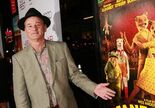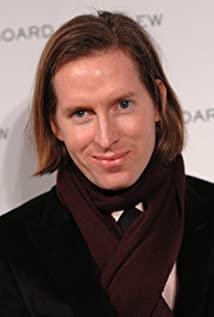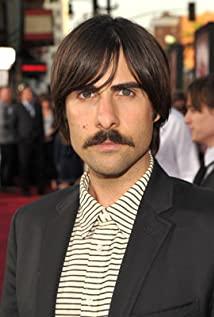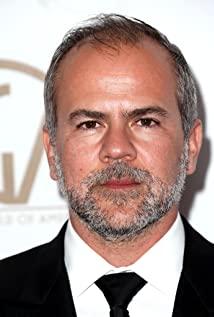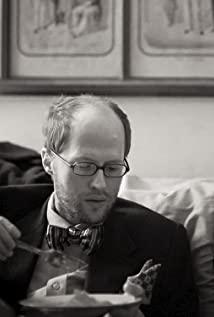At the end of "Fantastic Mr. Fox", Daddy Fox returned triumphantly, and he rode a car like Che Guevara The four-person motorcycle galloped on the small road in the wheat field. Suddenly, from a distance, he saw a pure black lone wolf on the barren hill. He immediately shouted the wolf's name in Latin and waved his hand in tribute, then I couldn't help but shed tears of excitement.
I have to say that this paragraph is the most touching paragraph in the whole film. Because, at such a moment, 40-year-old Wes Anderson (Wes Anderson) was separated by a middle-aged fox—actually himself—with a complex feeling towards his ideals many years ago. Waved to it and expressed deep respect.
In fact, this seemingly short glimpse is a long soul journey. It means that after thirteen years, people will get old, but some things have never changed from beginning to end.
It’s worth mentioning that Thirteen years ago, Anderson filmed his first feature film "Bottle Rocket" (the first short film), which talked about three young people, performing silly things again and again. Brain and absent-minded "criminal activities." However, they suffered from frustration again and again (the reasons are stupid), love, family, friendship have all been tested. After that, they regained their strength and made more unreliable People from join in, the scene becomes more chaotic. In the end, the initiator Owen Wilson went to jail, and the ending abruptly came to an abrupt end in one of his "prison escapes in disguise."
To be honest, it was filled with so many "stuns" Movies with "people" and cold jokes are really rare. What is even more shocking is that the author is not ironic, but is envious and "praising", as if he is also anxious to join this "adventure."
This film, as Anderson The starting point of his career, a certain specific style, has been run through in his subsequent films. The performance of the image is very simple, but it is shining with the "spark" of genius. The grasp of emotion and rhythm is so keen, then Attractive.
Moreover, his characters are like animals, acting with instinct and intuition, and they are frizzy and chattering like a neurosis. Once they have a whim, they will act recklessly...no wonder Martin Scorsese He will like it so much, and he will be full of praise-as a big fan of European movies, he will inevitably meet little fans like Anderson.
Regarding the creation of such a temperament, Salinger (JDSalinger) has a saying that can be used as a description. He said: "I think the really interesting book is this kind of book. After you read it, I hope that the author of this book is you. Good friend, as long as you are happy, you can call him at any time.”
Obviously, Anderson really hopes that his film will become "such a book." From this point of view, Anderson who has such a movie concept will not have Too high a posture, he will not use images to "painful contemplation", but it seems that he is doomed, and he will not be a mainstream director.
[2. "His works are equal to himself"]
Indeed, before the release of "Papa Fox" in 2009, the name Wes Anderson was very strange to many people, and could only remain in the independent film. In the circle, it was passed by word of mouth.
Back then, if this person was mentioned, then there must be a discussion about his strong "personal style". Even some loyal fans once said: "You only need to show me a frame of film, and I can tell if it is Anderson's work!"
This may be an exaggeration, but Anderson's work is so "good" Recognition"-his unique and weird aesthetics, his whimsical ideas, his witty creativity, his precise control over rhythm, space, color, music, and even the movements of the characters, his skillful camera push and pull And moving... Just one glance can make people impressed.
After all, maybe, just like how he feels like this person.
In public, Wes Anderson wears a half-size suit, each of which is different in color, matched with a light-colored shirt, and often changes a variety of bow ties or ties, which shows that he is a color And a person with a strong sense of style. Moreover, it is said that the clothes in Anderson's wardrobe are exactly the same as those in the wardrobe of "Mr. Fox", which proves that he and his character are almost a fit... At the same time, he is very white, thin, tall, and staying. She wears maroon half-length hair. At first glance, it looks like a character crawling out of a comic, intending to look at the world, and then go back to the painting book.
In 1998, as the most important work in Anderson's life, "Rushmore" was released. This is Anderson's reminiscence poem for his youth, a bittersweet confession. So frank, so touching.
In this film, he silently commemorates those who have had a great influence on him and his works, such as Salinger (JDSalinger), F. Scott Fitzgerald (F. Scott Fitzgerald), Truffaut (François Truffaut) And Mike Nichols.
You can clearly find the shadows of "Graduate", "Four Hundred Under", "Steal a Kiss", "Outlaws" and "The Catcher in the Rye" in this film. At the same time, the nostalgic rock of The Who and The Rolling Stone were also played and sung with sentimental voices in the background.
Unlike many creators who always hide themselves behind images, Wes Anderson, like his characters, is so straightforward and innocent. "The way he shows is all about him"-the next year of the next year will not be small. But it is unrealistic, believing something sincerely, which is quite ridiculous in the eyes of others.
Some people say, "Anderson is his work, and vice versa", I think it is very insightful. Anderson also admits that he is often in such a state-"The real life has become ridiculous, and it has begun to be unclear, whether this is his own film or not." His photographer Gregory Crewdson also exclaimed: "Why can he think With such a weird scene, I really doubt that he has been living in it."
Therefore, I have no doubt that the teenager in "Youth and Younger" is Anderson himself, wearing a red hat (marked by the protagonist of "Ryefield") and big black-rimmed glasses, looking lonely, stubborn, and quite weird. At the same time, he is versatile, good at stage plays, and keen on extracurricular activities, but his grades are in a mess, and he is on the verge of being dropped out of school (equivalent to not being recognized by mainstream values).
Soon, this young man with a rich emotional world fell in love with an older female teacher, and his love rival was actually his year-end friendship-a frustrated, rich middle-aged man, so he couldn't help but punish him. Little revenge.
As the director’s deliberate "self-innuendo", the most unlucky American teenager in history encountered almost all setbacks—he lost his mother in childhood, had a mediocre family (father was a haircut), was ordered to drop out of school, and was detained by the police. Show of love is ruthlessly rejected, always weak in fights, abandoned by friends... More unfortunately, he fails whatever he does (of course, Anderson himself is far from that miserable).
However, this is such a person, in the face of every frustration, he neither jumped up and worked hard, nor was he completely overwhelmed and depressed. He simply stood up again, then used his "enthusiasm" to "provoke" something, and then devoted all his energy to the aftermath.
What's more rare is that Anderson did not treat this role with compassion, just watching his every effort. This attitude towards life is obviously "Andersonian"-he does not rebel against the mainstream, nor does he cater to it, but is immersed in his own world and runs things that interest him. His works have never been ambitious, and he has never thought of reflecting the significance of the country, nation and society, but collecting, mixing and creating memories, hobbies and history that belong to him. At the same time, keep a prudent distance from the mainstream.
[3. Wandering between the mainstream and the edge]
In fact, Anderson is not always so peaceful. He also thought about making a movie that "closes to the mainstream", so "The Royal Tenenbaums" was born and won A very good box office income. However, many sharp-eyed film critics have seen the hollowness of its content. A person named AOScott sarcastically said: "Yes, it is smart and charming, but can I say good night and go to bed? "
Obviously, what Anderson didn't want was such "commercial success", so after that, he retreated in a rapid flow-quickly "withdrawing" to his small world with lightning speed. In his self-contained little world, there is a melancholy wandering on the deep blue ocean (The Life Aquatic with Steve Zissou); there is also a lonely soul wandering in the wilderness of India ("Across the Great Lucky Ridge (The Darjeeling Limited)").
From 01 to 2007, from "The Genius Family" to "Crossing Darjeeling", for six years, Anderson seemed to have committed a kind of "anti-mainstream strange disease" (quoted from the review by Michael Hirschorn of Ocean Weekly) ). Some people also think, "He is immersed in his own pale world like pickles." Even, many movie fans feel that Anderson's aesthetics is going to a dead end because "the shelf life of novelties has passed."
So, at this time, Anderson finally became his protagonist—he suffered setbacks, was isolated, his glory was no longer, and only Jiang Lang could sigh. But, at the same time, Anderson also showed the tough side of his protagonist. He said: "I have heard these thousands of times, and I am not interested in it anymore."
Then, he went to the advertising industry and continued to be very active in that field. Stubbornly and naively working hard. Just like his role, Anderson never thinks meaninglessly, nor will he be frustrated forever. There is always something new waiting for him in front of him. Of course, as a famous "weird", none of us understand Anderson's persistence very much, just as we can't really understand what that black wolf means to Mr. Fox.
But is "The Great Mr. Fox" a "compromise"? I have no idea. It is undeniable that this film retains a lot of Anderson's "personal style", and it is "perfect presentation".
For example, shots that are suddenly pushed forward and pulled back; for
example, a long parallel movement to show a scene of multiplayer scheduling; for
example, the expressionless chatter that the character is best at; for
example, at the key point of the plot Suddenly, there was an awkward blank space for a few seconds;
For example, cold jokes are everywhere; for example, there are always tricks and props in the details; for
example, the background music must use a few country folk songs or nostalgic rock; for
example, the subject matter must involve a family’s interior and External crises; for
example, the sensitivity and rebellion of young people; for example, the grief of life and death of humble and petty people (rats in the sewer);
and for example, the characters will fight back one by one with indomitable failures...about This, I can say one day and one night, because Anderson's essence is all in his every detail.
In fact, I was surprised. I don’t know how Anderson completed such a drastic transformation in two or three years—hidden his slow-tuned niche narrative and lingering emotions in a restrained manner and replaced it with , Super fast-paced, compact, crazy group carnival.
Perhaps in fact, we made a mistake at the beginning. Once, the characters he freezes in the picture seem to be warm, awkward, and sluggish. In fact, it does not mean that they cannot act quickly; his lens is often fixed at a strange angle, which does not mean that he is not normal. The use of lens; he presents less than 20 frames of content on a twenty-four frames per second film, but it does not mean that he can't force 30 frames into it. Of course, he can make the rhythm very slow or fast.
In other words, for Wes Anderson, all of this is controllable and adjustable. It is not too difficult, because he has always had a strong control over the audiovisual effects he wants to present. force. It turns out that we have been underestimating his true strength.
[4. Collecting Anderson]
In any case, collecting Wes Anderson (Wes Anderson) movies is a very happy thing. It’s not just my personal opinion. It’s said that the directors of American film production companies are willing to fund Anderson’s movies because they can "feel good", as if they are "collecting art", thus appearing to have good personal taste. It originated from a friend of Anderson, once quoted by The New York Times).
For domestic movie fans, Wes Anderson is also a special existence. First of all, so far, all of his six films, you can buy a very complete range-this is quite rare. In addition, you can buy the "Standard Collection" of CC for all four of them.
In these meticulously crafted versions, the cover of the dish case is a very attractive drawing book-pencils and watercolors are smeared with a large warm tone, the colors and composition are very clean and simple, and there are always one or several The person drawn with a few strokes is isolated in the center of the painting, exuding a strong "Anderson-like" smell.
In fact, Wes Anderson is not keen on whether he can maintain an enduring “art image”. Because he has been working hard to walk a tightrope. One end of the steel wire is a strong personal style that is difficult to give up, and the other end is the impatient and popular aesthetic taste of the public. For a long time, in the cruel competition between the two sides, he walked cautiously, with a sense of reluctance-if he fell, he would get up again, even if he might fall more miserably next time.
Of course, as long as there is a kind of persistence in life, you will grasp it persistently, pour it with ideals, never give up on it, believe in it, and eventually, even if you fail, you will still get the respect you deserve. However, I believe that "The Great Fox Papa" is not only a work worthy of respect, but also a perfect "magic work" that balances "personal style" and "popular orientation". Although this success did not come too early, it does not seem too late.
Of course, for Wes Anderson, who has long projected his spirit on the black wolf or the wider land, it is not too late any time, because he has always had a "dream" and has always On the way to pursue your dreams.
【over】
View more about Fantastic Mr. Fox reviews






